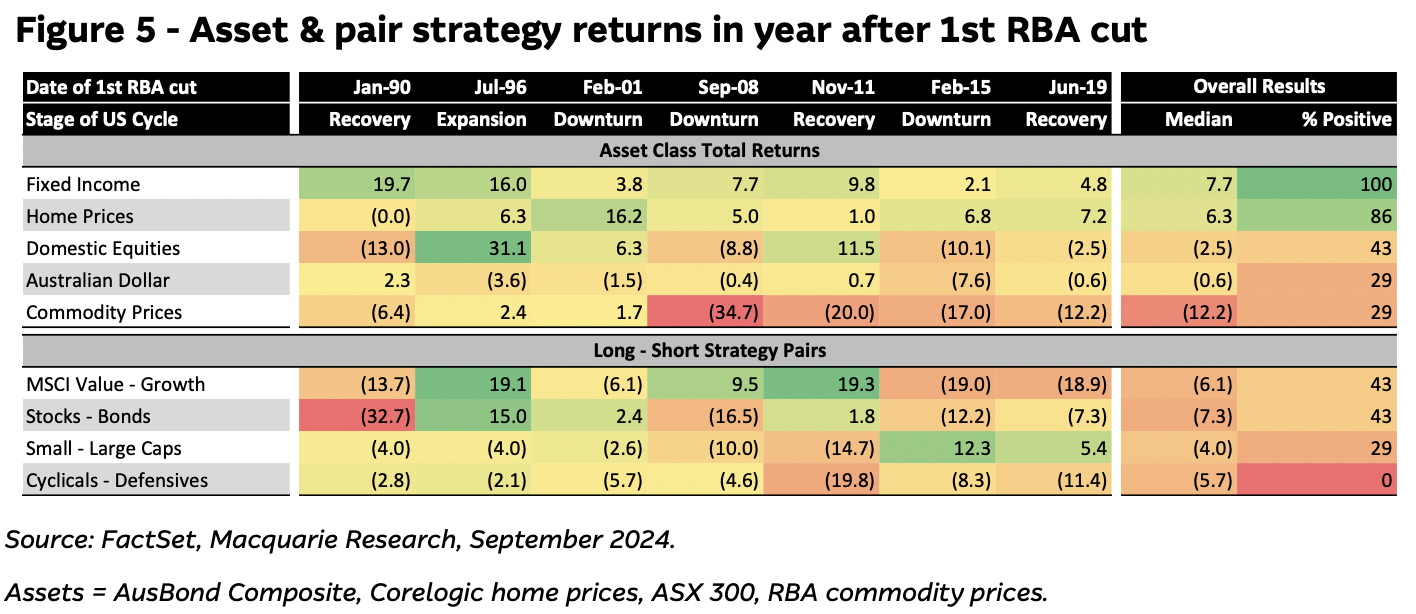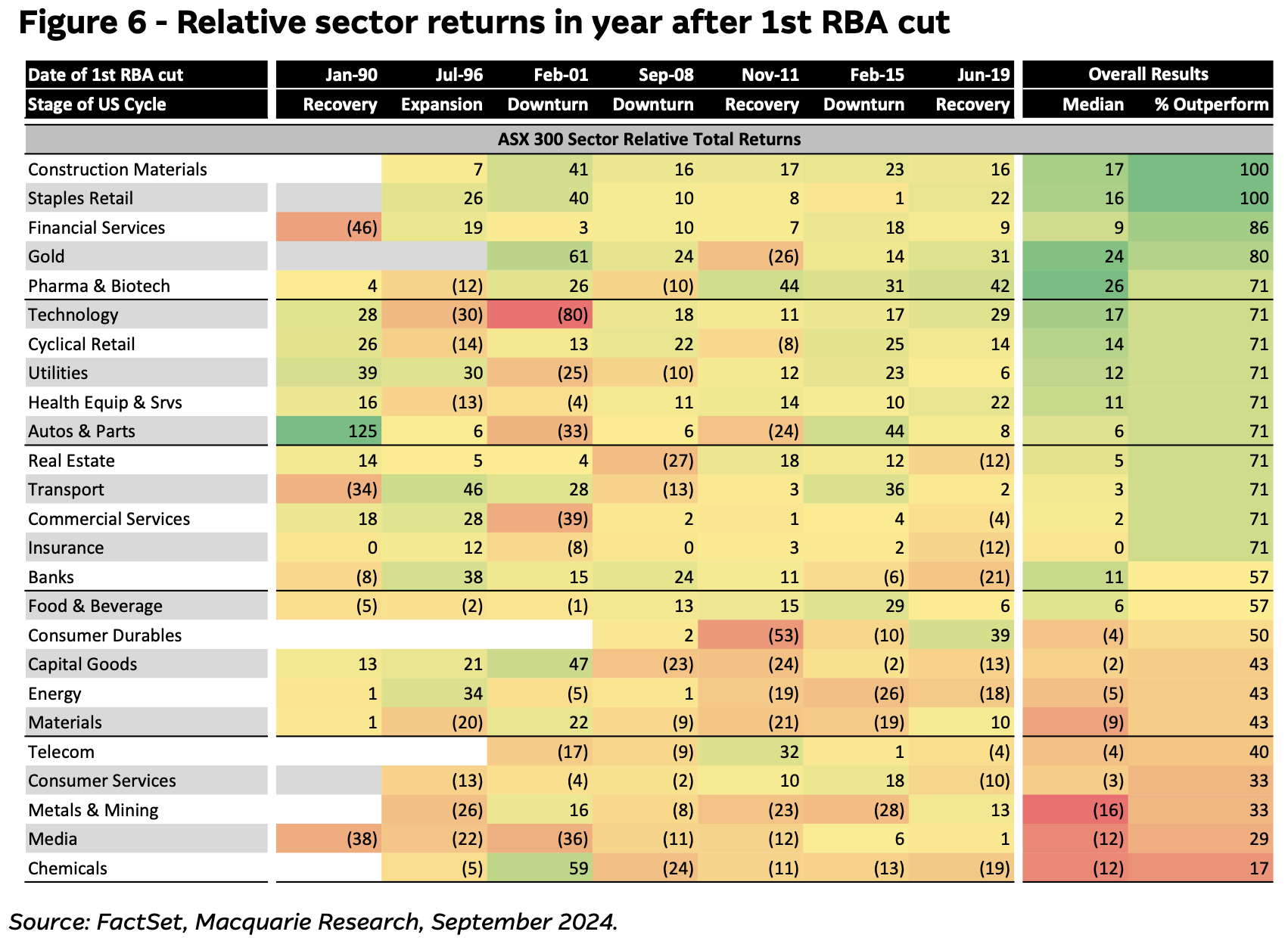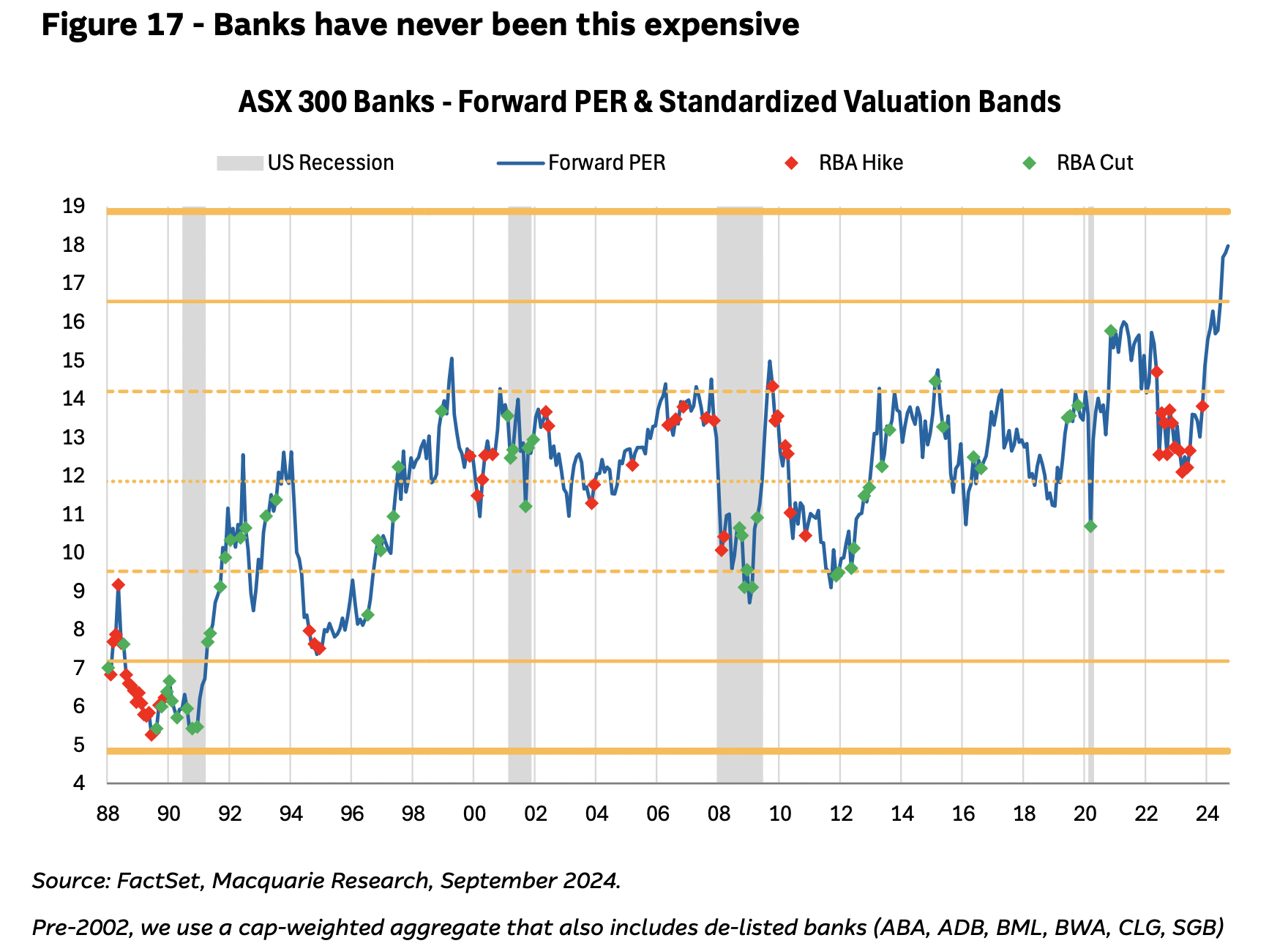8 stocks Macquarie believes could outperform when the RBA cuts
With the US Federal Reserve set to cut rates on Wednesday (although by how much is still up for debate), analysts at investment bank Macquarie have released a research paper on what an eventual Reserve Bank of Australia (RBA) cut could mean for the ASX.
For some background, analysts found that average returns following an RBA rate cut are less positive for the ASX than they are in the US, with the ASX up only three of the seven years after the central bank cut rates (since the early 1990s).
Analysts found that the US market cycle matters more for Australian share market returns than any moves made by the RBA. As such, with the US market cycle in a slowdown, analysts believe that ASX investors should expect below-average returns but with more volatility.
In addition, if the US market cycle moves into a downturn, Macquarie analysts said investors should prepare for a period of negative returns on the ASX - even if the RBA cuts interest rates.
But it's not all bad news - some sectors do outperform on RBA rate cuts.
In this wire, I point to some of the sectors and strategies that Macquarie analysts believe work best in an easing cycle, as well as some of the portfolio changes the team has made themselves to prepare for RBA cuts.
Asset class winners and losers 12 months after the first RBA cut
Macquarie found that, since the early 1990s - when the RBA shifted towards inflation targeting - asset class returns have favoured bonds and property markets over equities, the Australian Dollar, and commodities.
In each of the last seven cases, bonds have averaged a total return of 7.7% (and have delivered a positive return post the beginning of the RBA's easing cycles).
"The negative growth cycle and generally falling bond yields would both support the returns from bonds early in an easing cycle," analysts said.
In addition, Aussie homes have performed strongly on the back of rate cuts (except for a small fall after a cut in the 1990s). Analysts believe that rate cuts could improve affordability while also supporting prices, given mortgage rates would ease.

Australian equities, on the other hand, have delivered a mixed performance in the first year after an RBA cut - with analysts arguing that performance depends on whether P/E expansion from lower rates is enough to offset weakening earnings that often occur after the RBA eases.
"We see a risk of negative returns if the US cycle progresses to a slowdown (whether the RBA cuts or not)," analysts said.
Analysts also have a negative outlook on the Australian Dollar and Commodities - noting that the dollar tends to weaken after the RBA starts easing, and in an environment of slowing global growth (which is why central banks would cut) commodity prices tend to underperform.
Sector winners (and how Macquarie is positioned)
Macquarie analysts found that ASX sector returns followed their US counterparts following an RBA or Fed rate cut, pointing to five sectors, in particular, that have typically outperformed in the first year after central bank cuts.
Construction materials have historically been the best-performing sector - with Macquarie adding James Hardie (ASX: JHX) to the portfolio with this in mind. Analysts believe this aligns with rising home prices on RBA cuts.
They also pointed to sectors with defensive earnings, such as consumer staples and healthcare companies as key outperformers in easing cycles. These have also typically been the best-performing sectors in the US after the Fed's first rate cut. Macquarie's portfolio is overweight CSL (ASX: CSL), ResMed (ASX: RMD), Coles (ASX: COL) and Woolworths (ASX: WOW) to benefit from this.
Analysts also noted that gold stocks also tend to perform in the 12 months after the RBA eases - supported by falling bond yields. For exposure to gold, Macquarie has positions in Newmont Corporation (ASX: NEM) and Northern Star Resources (ASX: NST).
In addition, financial services have been a strong performer in Australia post an RBA cut, given that stocks in the capital markets sub-sector tend to benefit from rate cuts and lower bond yields, analysts said. Macquarie has increased its position in Block (ASX: SQ2) with this in mind.

Sector losers in the first year post an RBA cut
On the other side of the coin, sectors that typically underperform in the first 12 months after the RBA begins to cut rates are typically more "cyclical" or "value" orientated sectors - i.e. chemicals and mining/resources.
Media has also traditionally been a poor-performing sector, analysts said, but given that tech-like marketplaces make up a larger share of the sector today, media has outperformed in the last two rate-cutting cycles.
In addition, analysts believe that the banks are unlikely to outperform after cuts given record-high valuations today (see chart below):

While banks tend to outperform after cuts, with P/Es lifting on expectations for stronger loan activity, Macquarie's analysts believe that this time is different.
"The spikes in banks' relative returns in the 1990s occurred when the sector's valuation was much lower," analysts said.
"In stark contrast, the forward P/E for the sector today is the highest since our data set begins in 1988."
Given record-high valuations today, analysts believe the banks will underperform after the RBA cuts.
How are you positioned for an RBA cut?
Let us know in the comments section below.
5 topics
8 stocks mentioned

